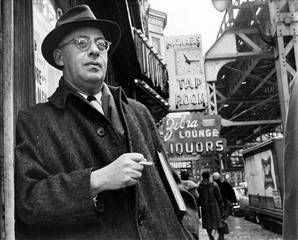Hillary's Thesis: Reading Her Missing Rosetta Stone
 Hillary Clinton's famous but largely unread thesis from her Wellesley days, There is Only One Fight, an analysis of radical organizer Saul Alinsky, left, has been called her Rosetta Stone by many on the Right who have been dying to read it.
Hillary Clinton's famous but largely unread thesis from her Wellesley days, There is Only One Fight, an analysis of radical organizer Saul Alinsky, left, has been called her Rosetta Stone by many on the Right who have been dying to read it.They couldn't, of course, because Wellesley passed a rule saying all Senior Theses were available to the public, except those of presidents or first ladies of the United States. The rule, requested by the Clintons, sequestered exactly one thesis and one thesis only.
They shouldn't have bothered. The action created a mystique around the thesis and speculation about the radicalness of Hil's roots. Like so many the Clintons' herculean efforts to protect their image, hiding the thesis allowed speculation, which of course ran anti-Hil, instead of analysis.
I have read Alinsky's Rules for Radicals because I realized after a few years of fighting Greenies and NIMBYs that they were following those rules. It was awful reading but good intelligence. Many on the right have thought it showed Communist roots at Hil's core and hankered to read the thesis.
It turns out they could have. Bill Dedman of MSNBC simply walked into the Wellesley archives and requested it. Anyone can now, since Hil is neither first lady or president.
Based on Dedman's account, there's not much there there. The 21 year old newly center left coed spent a bit of time complimenting Alinsky and his tactics, and some of it could certainly be extracted and used against her -- like the supposition that Alinsky isn't really all that radical.
But if Dedman's analysis is to be trusted (he's with MSNBC ... hmmm), the thesis boils down to this:
In other words, Hil's belief is that if you want to help people, you need to take Alinsky's love of the underdogs, the huddled masses, and apply it through landscape-scale politics, not local organizting. No surprises there.In the end, she judged that Alinsky's “power/conflict model is rendered inapplicable by existing social conflicts” — overriding national issues such as racial tension and segregation. Alinsky had no success in forming an effective national movement, she said, referring dismissively to “the anachronistic nature of small autonomous conflict.”
I'm looking forward to seeing more analysis of the thesis, but beware if you begin to see it as a swiftboat document. I remember campus thought in that era, and this thesis appears to be pretty timid by comparison.
Besides, what person in their late 5os/early 60s would want to be judged by what they were doing in their early 20s. I was a pot-smoking, anti-war, left-wing idiot back then. I learned from the experience, but I should not be measured by it.




<< Home